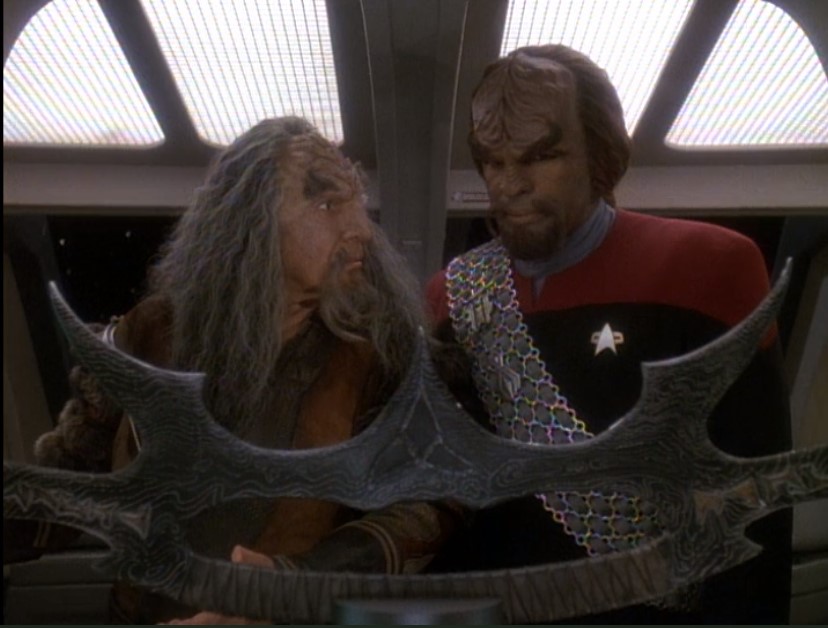
Klingon culture is dominated by a warrior ethos and honor, which is held above all other things in Klingon society. After honor, a Klingon’s House and family are also highly important. A Klingon’s honor reflects not only on himself, but also his immediate family and fellow House members. A Klingon who rejects or violates this code suffers the scorn and approbation of his fellows.
Although Klingons carried disrupters, they tended to be well-trained in hand-to-hand combat, with their bladed weapons of choice being the bat'leth (a curved, bilateral sword that can decapitate its victim with one stroke) and the mek'leth (a two-pronged dagger typically used to slash the throat or disembowel).
Personality: Klingons are aggressive, brutal, blunt, and tough. They say what’s on their minds, approach problems directly, do not back down from confrontations, and tend to resolve difficulties with violence. Most subscribe to a code of personal honor.
Physical Description: The typical Klingon is taller, broader-shouldered, stronger, and tougher than the average Human. Klingons have dark brown skin and dark eyes. A set of bony ridges, distinctive to each Klingon, adorns their high foreheads and sometimes descends down to the bridge of the nose. Both sexes wear their black hair long and flowing (or occasionally, tied back in a ponytail).
Example Names: Klingons go by their given names mainly, though many belong to or serve a House, for example Worf, son of Mogh, House of Martok. Other names: Kor, B’Elanna, Lursa and B’Etor (both of the House of Duras), Koloth, Kahless, Kang, Gowron, Kurn.
Klingon Specie Traits
- +2 Strength, +2 Constitution, -2 Intelligence, -2 Wisdom, -2 Charisma. Klingons are strong and tough, but their warrior culture tends to have them focus on that prowess and their mental abilities suffer. Also, their violent and abrupt nature tends to make others feel uneasy around them.
- Medium-sized: As Medium-size creatures, Klingons have no special bonuses or penalties due to their size.
- Klingon base speed is 35 feet.
- Klingon Weaponry: Klingons begin teaching their children at an early age how to wield weapons. As such, all Klingons automatically gain the following feats:
- Exotic Weapon Proficiency (Bat’leth)
- Exotic Weapon Proficiency (D’k tahg)
- Exotic Weapon Proficiency (Mek’leth)
- Brak’lul: Klingons possess duplicates of many of their vital organs. They have an eight-chambered heart, two livers, and twenty-three rib pairs. This redundancy, called brak’lul, makes it much harder to kill, incapacitate, poison, and infect them with diseases. Brak’lul gives Klingons a +3 species bonus to Fortitude saves. Brak’lul also makes Klingons harder to incapacitate with a weapon’s stun settings. When hit with a weapon’s stun effect, divide the effect’s duration in half (round down) to a minimum of zero.
- Klingon Rage: When necessary, Klingons can fly into a frenzy. In a rage, a Klingon gains phenomenal strength (even for a Klingon) and durability, but becomes reckless and less able to defend himself. He temporarily gains +4 Strength, +2 vitality points per level, and a +2 rage bonus on Fortitude and Will saves, but suffers a -2 penalty to Defense. While raging, a Klingon cannot use skills or feats that require patience and concentration, such as Stealth, Combat Expertise, or any Psionic-based skill. A fit of rage lasts for a number of rounds equal to 5 + the character’s Constitution modifier. At the end of this duration, the Klingon loses the bonus vitality points gained from the rage and is fatigued(-2 penalty to effective Strength and Dexterity, can’t run or charge) for a number of rounds equal to the rage’s duration.
- Honor: Klingons put a high value on their reputation as honorable warriors. An honorable Klingon can count on the support of other Klingons in times of need, while dishonorable Klingons are frequently the targets of attack or even banishment (called discommendation). A Klingon with high Honor (measured by Reputation) can persuade others to join him in a quest, ally with him/her politically, or join him/her under his/her banner.
A Klingon gains enhanced benefit from his/her reputation, improving his chances to persuade another Klingon to assist him or intimidating a fellow Klingon into submission (both because of his status). A Klingon’s honor modifies his social interactions with other Klingons when making Diplomacy, Bluff, Intimidate, and Gather Information checks involving other Klingons, the character adds his/her Reputation Modifier to the skill test, if he/she is considered honorable.
If he/she is considered a dishonorable Klingon, or has been discommoded, it applies as a penalty to those checks. Feats like Fame and Infamy do not affect whether a Klingon is considered honorable by other Klingons. Being infamous for committing crimes against the Federation, for example, could be viewed as honorable to many Klingons. On the other hand, being famous for being the only Klingon in Starfleet, for example, could be viewed as dishonorable to many Klingons.
- Automatic Language: Klingon

